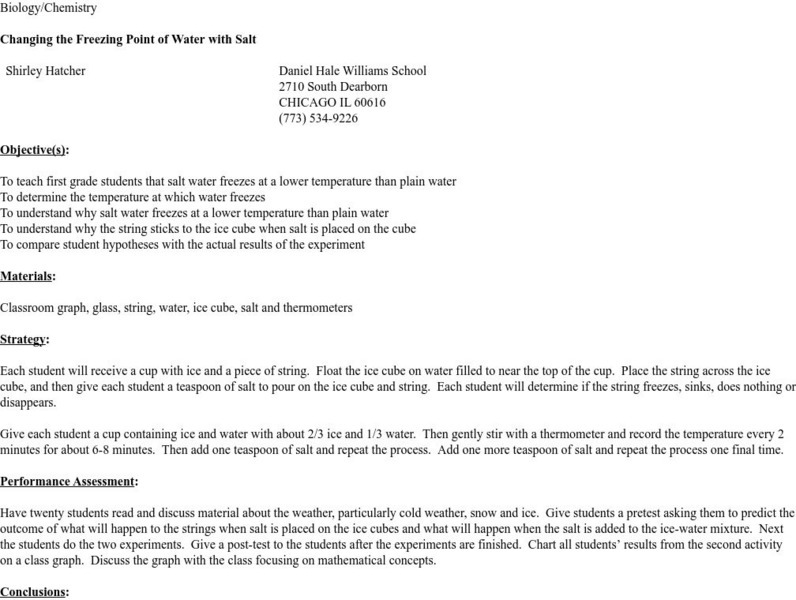Hi, what do you want to do?
Curated OER
In Harm's Way: Natural Disasters in My Community
Eleventh graders research and debate natural disasters that have occurred in their community. They assess whether these natural disasters were avoidable or were accidents. They investigate the extent of insurance coverage for disasters.
Curated OER
Australia, Oceania, and Antarctica Today
Students explore the importance of research in Antarctica, then explain how snow becomes part of the Antarctic ice cap. They explore Antarctica's harsh environment and discover how scientists drill ice cores and what information ice...
Curated OER
Using a Thermometer
First graders use their senses to formulate questions and make predictions to determine what is in the "Wonder Bag". They hold pieces of ice and examine while listing descriptors on a chart and then take their own temperature using an...
Curated OER
Antarctica
Students explore why Antarctica is so important to the planet. They investigate the physical characteristics. Students create their own unique treaty of governance for Antarctica and discuss how laws are enforced in Antarctica.
Curated OER
Environment: Erosion Boxes
Fourth graders discover how the processes of erosion and weathering alter the physical characteristics of the environment. In a student log,they record the various types of erosion and list ways to prevent it. Using clear, plastic...
Curated OER
Less vs. Fewer
When should you use less, and when should you use fewer? Straighten out this dilemma with a helpful resource about using less vs. fewer based on sentence context clues. After reading detailed instructions and examples, young learners...
Curated OER
Properties of Fresh and Sea Water
Learners work with three stations to demonstrate the properties of water. They explore water's boiling point, freezing point, and its ability to store heat.
Curated OER
Clouds
Test your students' science and/or reading comprehension skills with this activity, which provides a page of information about clouds and cloud classification. Both an earth science teacher and a language arts teacher could use this...
Curated OER
Summer Science Lesson Plans
You can use these lesson plans to incorporate some science into your summer.
Curated OER
Sleet and Hail Have Their Own Seasons
Second graders explain the definition of hail and sleet. In this precipitation lesson, 2nd graders discuss when hail and sleet fall and the results of hail falling.
Curated OER
Climate Change Effects on Organisms and Ecosystems: You are the Experts!
Seventh graders research about the effect of climate on different ecosystems. In this life science instructional activity, 7th graders present their research by creating a poster, infomercial, skit or song. They discuss how organisms...
Curated OER
Be Used To -- Grammar Worksheet
In this language arts worksheet, students learn the correct use of the "be used to" phrases by first studying an information chart. Students then complete sentences using "be used to" in the correct form. Example: Moving men (are used...
Curated OER
Outdoor Survival
Pupils are introduced to basic outdoor survival concepts. They identify the seven basic needs for survival. Students describe the symptoms and treatment for frostbite and hypothermia. They compare and contrast the value of different...
Curated OER
Regolith Formation
Students compare and contrast the process of regolith formations. In groups, students define regolith and discover how regolith is formed on the Earth and on the Moon. They participate in experimental activities to simulate regolith.
Curated OER
My Habitat Address
Sixth graders draw a habitat and write about what they would need to survive in the habitat. They define the input of items such as materials, energy, and information, and what goes out of the habitat. They play a "Habitat Address" game,...
Curated OER
Space Science: A Scoop of Moon Dirt
Students discover soil characteristics and how it is formed on Earth and the Moon by examining local samples to a lunar simulant. They replicate the effects of wind erosion by scraping dry bread with sandpaper. Students use rocks and...
Curated OER
Erosion: On the Move...Defending the Coast Against Wave Attack
Young scholars study how people have tried to save beaches from wave erosion. They examine what has occurred to Cape Hatteras as a result of beach erosion and the efforts to reduce the erosion.
A&E Television
History.com: How Early Humans Survived the Ice Age
The most recent ice age peaked between 24,000 and 21,000 years ago, when vast ice sheets covered North America and northern Europe, and mountain ranges like Africa's Mt. Kilimanjaro and South America's Andes were encased in glaciers. At...
Science and Mathematics Initiative for Learning Enhancement (SMILE)
Smile: Changing the Freezing Point of Water With Salt
This lesson plan teaches first grade students basic chemistry and physics principles--that saltwater freezes at a lower temperature that plain water.
Woods Hole Oceanographic Institution
Polar Discovery: Compare the Poles
A detailed comparison of many aspects of the two polar regions. Includes physical features, seasons, weather, types of ice, plants and animals, human population, and climate change.
























